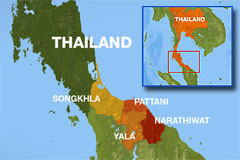Troops killed in southern Thailand
Ambush is latest in a string of attacks that have claimed 340 lives so far this year.

Muslims in Yala, Narathiwat and Pattani – the only provinces where they are the majority in the largely Buddhist country – have long complained of discrimination by the central government.
Separatist fighters have been battling security forces in the area since 2004 and around 3,500 people – Muslims and Buddhists – have been killed in the five years.
Surging violence
The violence began to rise again this year with an average of 100 incidents a month – the highest monthly figure since 2007, according to Srisompob Jitpiromsri at Pattani’s Prince of Songkhla University.
| Thailand’s troubled south |
|
Many complain of being treated as second-class citizens in mainly Buddhist Thailand. The area was a semi-autonomous Islamic Malay sultanate until annexed by Thailand in 1902. Several violent uprisings have been put down by the army over the century. The latest uprising flared in January 2004 when fighters raided an army base, killing four soldiers. Despite martial law imposed in 2004 and thousands of Thai troops in the region, frequent attacks blamed on Muslim fighters have left around 3,500 people dead. |
More than 340 people have been killed since the beginning of 2009.
A Muslim teenager was killed in Yala on Saturday when his neck was slashed and his body set on fire.
Police could not say who killed him.
And last week, suspected separatists shot dead a Buddhist defence volunteer and set fire to his body in Pattani, police said.
Thousands of paramilitary troops – usually residents hired as armed auxiliaries to the regular military – have been deployed in the area alongside 30,000 army troops.
The military recruits Muslims and Buddhists, hoping their familiarity with the area and people will give authorities an edge over fighters.
But many locals accuse the low-paid rangers of abuses and human-rights violations.
Analysts have warned that the arming of what many see as poorly trained residents with scores to settle could make the situation even more volatile.
A report earlier this year by Nonviolence International, US-based pacifist group, said that the ability to distinguish between security officers, fighters and criminals in the area is increasingly difficult amid an atmosphere of suspicion and paranoia.
“Each new act of violence not only incites acts of revenge but also brings to the fore sentiments of nationalist extremism and ethno-religious divisions,” the report said.
